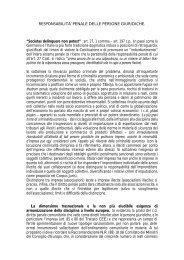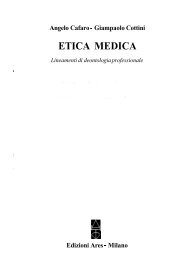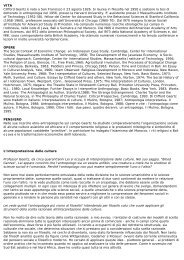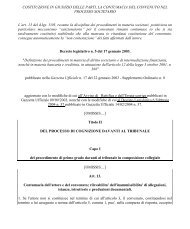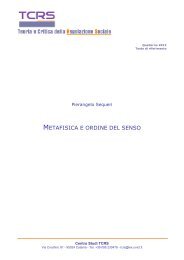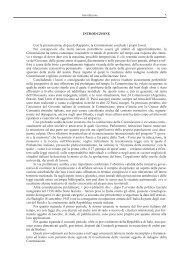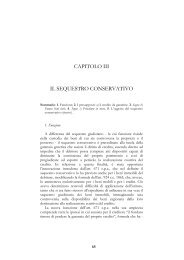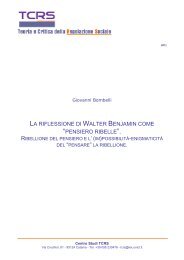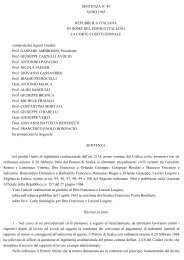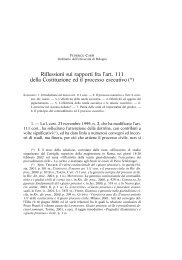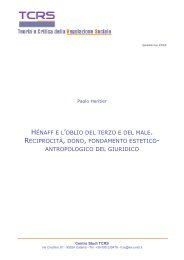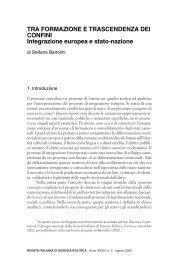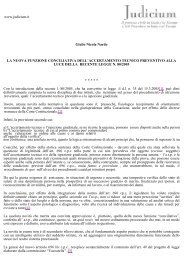FOGLI DI LAVORO per il Diritto internazionale 3 ... - Giurisprudenza
FOGLI DI LAVORO per il Diritto internazionale 3 ... - Giurisprudenza
FOGLI DI LAVORO per il Diritto internazionale 3 ... - Giurisprudenza
Create successful ePaper yourself
Turn your PDF publications into a flip-book with our unique Google optimized e-Paper software.
188<br />
<strong>FOGLI</strong> <strong>DI</strong> <strong>LAVORO</strong> <strong>per</strong> <strong>il</strong> <strong>Diritto</strong> <strong>internazionale</strong> 3/2008<br />
They pointed out that the right to choose and profess one's<br />
religion was an original individual right which was not bestowed<br />
by the State. They further maintained that the Convention did<br />
not limit the applicab<strong>il</strong>ity of Article 6 § 1 to rights of a<br />
pecuniary nature. The field of “civ<strong>il</strong> rights” traditionally<br />
encompassed a number of non-pecuniary rights including those<br />
relating to religious questions, such as the right to religious<br />
education.<br />
42. Even assuming that the right to freedom of religion<br />
should not be generally accepted as a “civ<strong>il</strong> right” within the<br />
meaning of the Convention, Article 6 was applicable to the<br />
specific circumstances of the present case. The impugned<br />
Government actions had been aimed at influencing citizens'<br />
behaviour relating to the applicant associations' religious groups.<br />
Furthermore, the impugned statements had had a direct effect on<br />
the applicant associations' and their members' honour and<br />
reputation and their possib<strong>il</strong>ity to publicly profess their religion.<br />
43. The applicant associations finally maintained that the<br />
proceedings before the administrative courts were a prerequisite<br />
for bringing an action for damages against the Government<br />
before the civ<strong>il</strong> courts, as the administrative courts were better<br />
placed than the civ<strong>il</strong> courts to examine the legality of<br />
governmental actions.<br />
3. Assessment by the Court<br />
44. The Court notes, firstly, that the Government have not<br />
denied the existence of a dispute within the meaning of Article 6<br />
§ 1. However, they maintained that the dispute in question did<br />
not concern the determination of the applicant associations' civ<strong>il</strong><br />
rights within the meaning of Article 6 § 1 of the Convention.<br />
The Court reiterates that, under its case-law, the concept of<br />
“civ<strong>il</strong> rights and obligations” cannot be interpreted solely by<br />
reference to the domestic law of the respondent State. On<br />
several occasions, the Court has affirmed the principle that these<br />
concepts are “autonomous”, within the meaning of Article 6 § 1<br />
of the Convention (see, among other authorities, König v.<br />
Germany, judgment of 28 June 1978, Series A no. 27, §§ 88-89,<br />
and Maaouia v. France (dec.), no. 39652/98, ECHR 1999-II).<br />
Accordingly, whether or not a right is to be regarded as “civ<strong>il</strong>”<br />
must be determined in an autonomous way by reference to the



